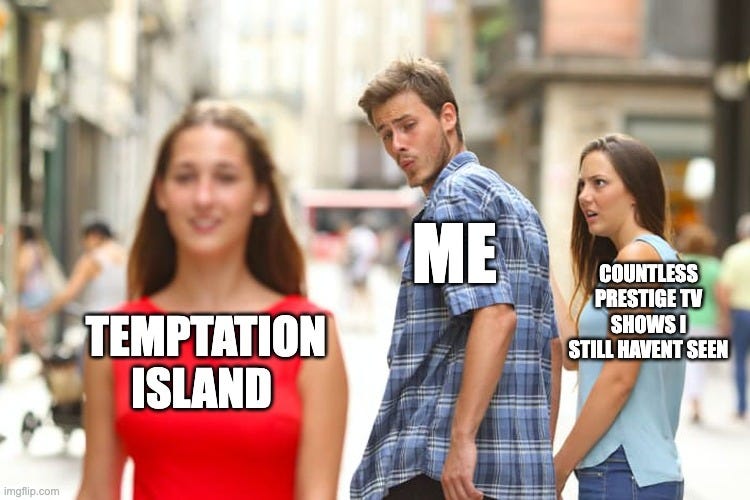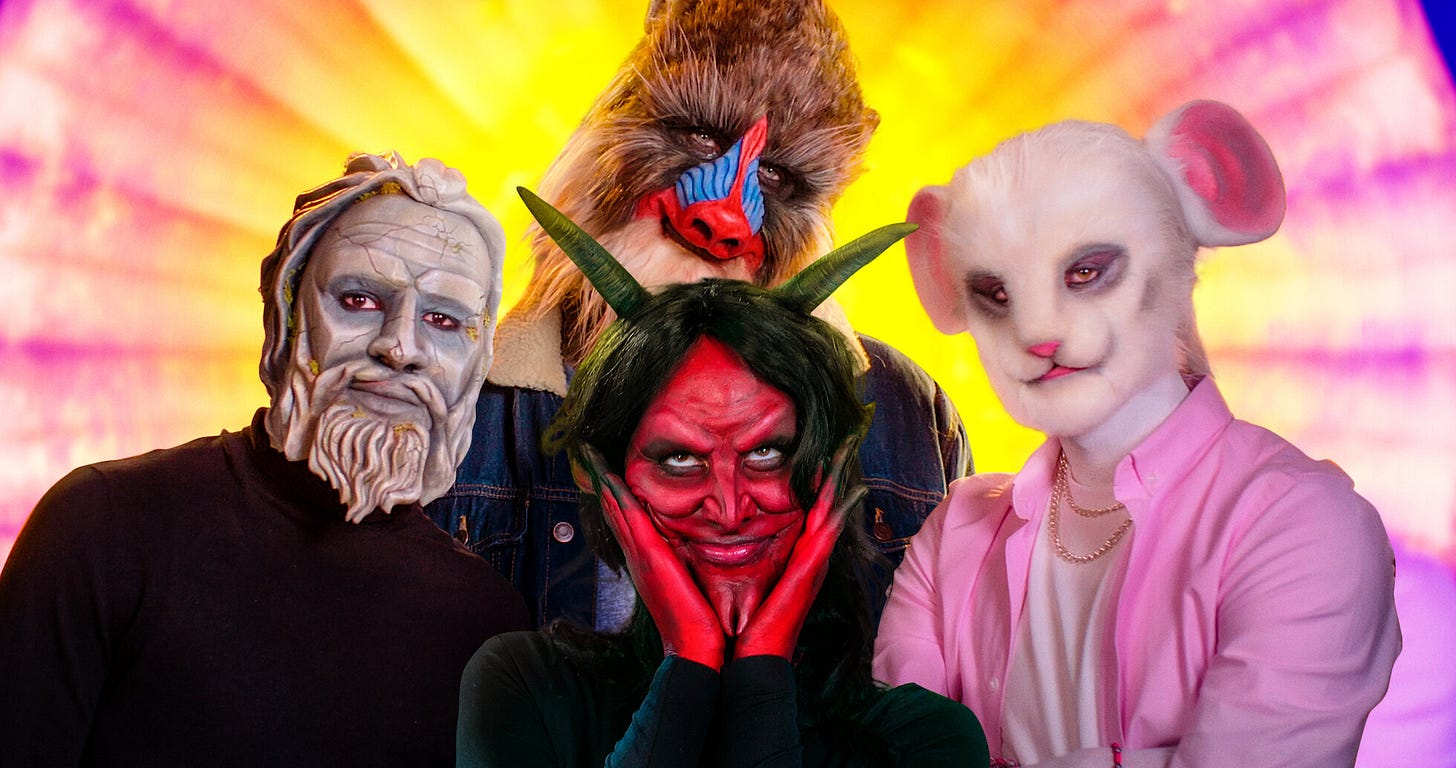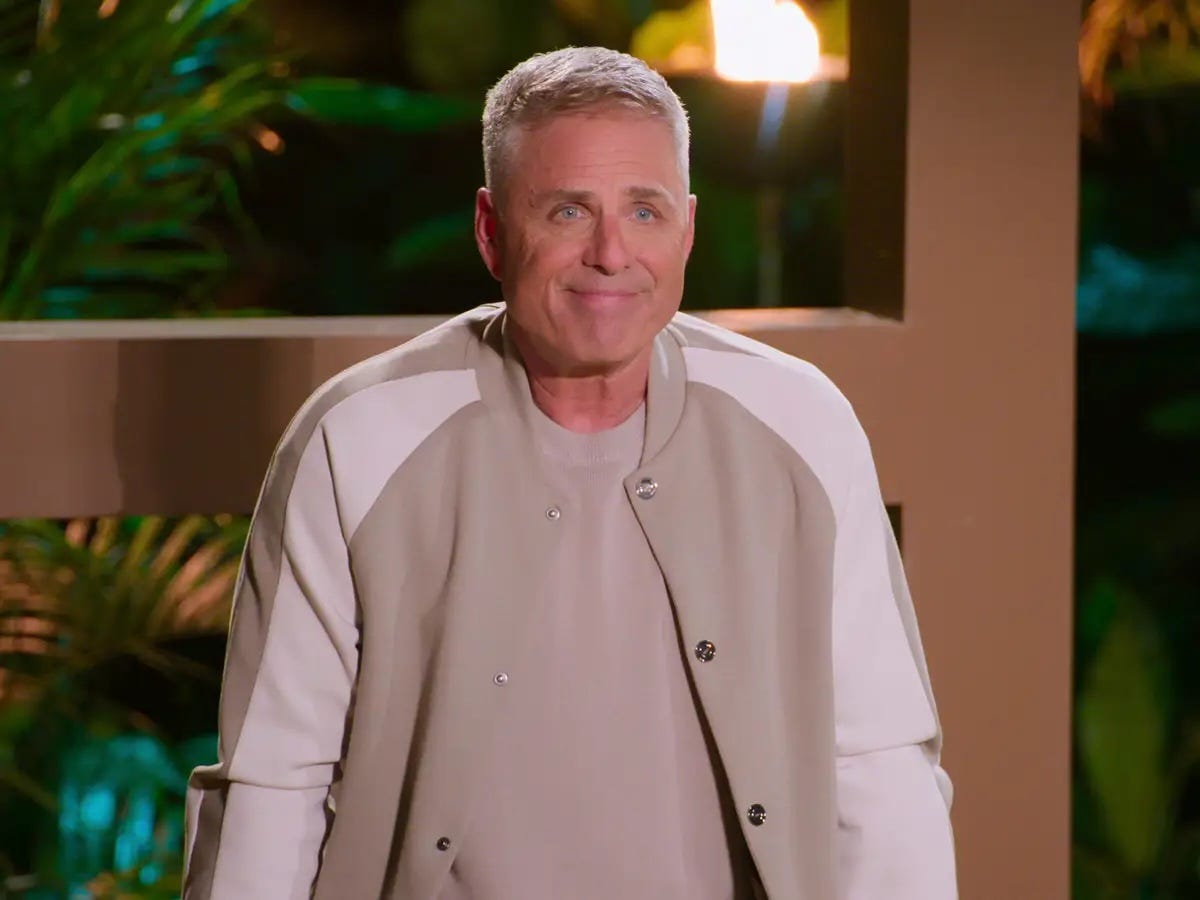It's Tempting
Is Netflix's Temptation Island everything wrong with reality TV or secretly amazing?
It’s tempting to dismiss Temptation Island as the epitome of the kind of disposable dating show that’s conquered Netflix and our collective attention spans.
Skeptical viewers already chucked this in the bin alongside its cousins metastasizing across streaming: Love Island, FBoy Island, Ex on the Beach, Milf Manor, Love is Blind, and Are You the One?
On the flip side, hardcore fans may prefer Naked Attraction, which cuts out the preamble by having everyone start unclothed or Sexy Beasts, where singles wear full prosthetic animal costumes, in case you wanted to simulate watching Love is Blind while having a bad acid trip.
Or you could watch Perfect Match, a dizzying mashup of all these shows inexplicably hosted by Nick Lachey.
At its worst, this sprawling genre is pointless noise, so desperate for attention that it can’t bother to create coherent television.
As I wrote in my review of Too Hot to Handle,
“With clashing incentives muddying everything, the result is neither the lusty rush of bathing suits coming off nor the wholesome arc of people learning to better themselves. It’s a dissonant and remarkably boring show where all of the sizzle quiets after the first episode, like a cast iron tray of fajitas sprayed down with a fire extinguisher by a paranoid uncle.”
But here’s the thing: Too Hot to Handle was a COVID-induced desperation watch that felt like inhaling a sleeve of Oreos through my corneas. I’ve watched Temptation Island three times, satisfying a hunger I didn’t know I had.
This show either hits the so-bad-it’s-good genre on the bullseye or is secretly profound.
The more I watched, the more I realized that beneath the slutty bathing suit exterior, Temptation Island is a surprisingly fun and insightful look into what makes relationships sink or swim.
You could describe the premise as superficial at best and immoral at worst.
Four couples at a crossroads fly to an island, split into gendered villas full of gorgeous “tempters,” and the cameras roll to see who will stray and who will stay. It’s a particle accelerator for fuckboys, a large hadron collider for aspiring influencers, “fuck around and find out,” the show.
Most reality TV works this way now: cast hot singles, drop them in a tropical villa with minimal clothing and maximum drama, and let the cameras capture the chaos.
Yet when Temptation Island debuted on Fox in 2001, many were shocked, arguing it openly encouraged affairs.
Two decades later, that moral panic feels almost quaint.
This was before our thrice-married president bragged about grabbing women by their genitals, before open relationships went mainstream, before Esther Perel showed us how instructive dysfunctional love could be in Mating in Captivity and Where Should We Begin?.
While the threat and/or draw of infidelity is intrinsic to this show’s DNA, what’s most interesting about watching it isn’t who cheats.
Savvy viewers can guess that ten minutes into episode one.
Hint: it’s the men with the most punchable faces and the one who won’t stop mentioning threesomes. Yes, those guys.
It’s also not about when or how.
What could be a mystery plays like the world’s most basic game of Clue: “It was the bikini model, in the hot tub, with the chocolate-covered strawberries!”
What’s truly interesting is how the predictable breakdown of predictable people reveals so much about men, women, and the messy things we call relationships.
It’s tempting to dismiss the people on this show as copy-pasted influencer types.
The men are ripped, allergic to fully buttoned shirts, and have little between the ears. The women are skinny, shiny-haired, and the kind of pretty that looks expensive, implying boutique Pilates, regular injections, and quarterly splurges at Sephora. All appear to be personal trainers, models, or some combination of the two.
The ingredients may be vanilla, but their dynamics are the secret sauce.
Tyler is an aspiring model waiting until his big break to help Tayler with the bills and the housework. Tayler resents using her Michelle Obama arms to clean up after him and he feels perpetually undervalued.
Grant, a narcissist who looks like Beavis from Beavis and Butthead, is so self-involved he makes Tyler’s fuckboy routine look saintly. Ashley—blonde and buxom, as if lab-engineered for reality TV—loathes and distrusts him based on a history of infidelity.
Brion, a suave financial advisor and self-professed player, brings up threesomes with everyone he meets. This makes his pint-sized queen Shante rightfully insecure about their future together.
Lino looks like ChatGPT’s rendering of an Italian American who lives to bench press. He doubts Alexa—a traveling nurse with impeccable skincare—is committed, since she cheated early in their relationship after a messy divorce. The least problematic man here (a low bar), his impeccable shirts can’t hide his lack of game.
While I couldn’t stand half of the contestants, I also couldn’t look away from them.
At first I thought this was the unique gravity of hate watching. Sure, 75% of the men are simply awful, but a dumpster fire provides a surprising amount of warmth as long as you plug your nose.
As the people alternated between making me want to scream “dude, do better” and “girl, get out!”, the show quietly circled a deeper question:
“Should I stay or should I go?”
Knowing when to leave and when to stay in a relationship is one of the most important decisions we can make in life. The titular island is really an experiment with a lot to say about love, lust, and a quote my therapist said years ago that’s stuck with me ever since:
“Relationships are not for the faint of heart.”
The setting, luxury villas on Hawaii’s Big Island, is nearly as artificial as the people staying there.
Nothing about this is normal. Isolation, zero privacy, and bottomless booze would make most of us act like buffoons and/or baboons. The producers constantly meddle in these relationships the way the U.S. meddles abroad. Yet the extremely artificial setting produces some very real learnings right away.
The men’s and women’s villas are profoundly different places, speaking volumes about how society shifts depending on who holds the power.
The men’s villa instantly devolves into a frat party. Instead of talking about feelings, the men drink to forget them, then chase younger versions of their girlfriends who don’t yet know their flaws.
In the women’s villa, men need the women’s approval to initiate anything. Evenings are calmer, led by open conversations where respect is the price of admission.
Yet even in the men’s den of iniquity, there are moments of growth. When womanizer Brion disrespects Shante yet again, multiple temptresses call him out. He tries to dodge, but they point out his words and actions don’t match. If he can’t be honest with himself, why should Shante trust him?
Moments like these are the core of why I enjoyed Temptation Island.
Lesser reality shows thrive on deception and dishonesty. Joe Millionaire tricked women into thinking they were courting a wealthy dude and Too Hot to Handle tricked everyone into believing they were on a different show entirely. This can be fun to watch, but it feels cheap, contrived, and forgettable in the long run.
Temptation Island forces flawed people to be more honest with themselves and each other. Not only is this infinitely more watchable than another season of Who Wants a Chunk of the Drunk Hunk?, it’s a surprisingly tender premise to learn from.
When it comes to making a solid relationship or TV show, honesty is the best policy.
Many of the on-screen activities are inane conversations in flowy beachwear and contrived swimsuit shenanigans, so basically Season 3 of The White Lotus.
Beneath this tropical white noise lies the connective tissue of the show: a sequence of dates and bonfires. Dates pair contestants with tempters to explore new connections. Think boring small talk over uneaten gelato in beautiful settings, most of it about the “deep connection” they’ve built in 72 hours.
At bonfires, the core couples meet the host to discuss progress and watch clips of their partner across the island.
The bonfire clips, the Palantír of Promiscuity, are the juiciest part of the show. Like Tolkien’s orb, they show you elsewhere but sometimes make it easy to misread what you’re seeing. Lino gets done dirty when Alexa’s line—“I don’t need him, but I do want him”—is cut to just the first half.
Mostly, the women learn the men’s eyes have already wandered, and the men learn the women aren’t as naive as they’d hoped.
Shante sees Brion having a threesome in the shower, or, as our TV’s subtitles summarized it:
Rhythmic wet slapping noises.
Ashley watches Grant display the memory and maturity of a goldfish as he immediately pursues a 22-year-old.
Tyler learns that Tayler said he has “bitch tendencies,” something he doesn’t dispute, opting to shrink into the kind of petty, defensive nitpicking that likely earned him this descriptor in the first place.
Then come the “temptation havens”—camera-free spaces for couples to canoodle, or more. The women’s version looks like a boutique Airbnb yurt; the men’s, a down-budget sleepover fort. The catch: whenever someone enters, red lights flash at the other villa, broadcasting the shenanigans afoot. It’s a cheap, but effective gimmick. The introduction of “the sex teepee,” as Alexa calls it, throws water on the smoldering ruins of two relationships and gasoline on the embers of two new ones.
For some people, all it takes to abandon their relationship is an open bar and a strategically placed pup tent.
It’s tempting to think host Mark L. Wahlberg is gratuitous. Why is Mark—aka “the other Mark Wahlberg,” aka “male Ellen DeGeneres”—here at all?
His résumé doesn’t explain it, but his bonfire talks do. The couples supply the drama; Mark supplies the growth.
When Tayler breaks down, convinced Tyler’s abandonment is just like everyone else who’s left her, Mark walks her back from the cliff:
“That’s a story you’re telling yourself right now. But it doesn’t have to be true.”
Moments like these made me swear he had a therapist feeding him zingers through an earpiece, only to learn he was flying solo. Like Queer Eye, the best moments are the tender ones where people learn to love and trust themselves. These moments, prompted by Mark’s earnest reactions, guided me to the kind of realizations normally gated off by relationship books and podcasts:
Many relationships fail from broken communication. Without it, misunderstanding and neglect pile up, breeding resentment: the toxic mold of any bond.
Compassionate honesty is hard but essential, and it starts with yourself. If you’re in denial about who you are and what you want, you can’t sustain a stable, loving relationship.
The gap between the story you tell yourself and the life you’re actually leading is where the real work begins. Tayler tells herself everyone leaves her, and that fatalism becomes a self-fulfilling prophecy. Grant and Tyler both insist they’re doing nothing wrong and their resentful partners “just don’t get them,” dodging accountability for their own selfishness. Brion pretends his actions have no consequences—until Shante, Mark, and half the villa force him to face the damage he’s done.
By refracting their relationships through a funhouse mirror of TV trickery, Temptation Island ends up showing everyone truths they’ve been ignoring all along.
Mark L Wahlberg would tell it to you straight, so I will too: this series is fun but has as many flaws as the relationships depicted.
When the tempters first appear, they introduce themselves with groan-inducing lines like, “I’m a fitness instructor, and I can’t wait to stretch your girl out.”
It reminded me of MTV’s dating show, Next, whose contestants always introduced themselves with legendarily unhinged lines like
“I’ll just go ahead and say it: curvy girls make my junk twitch.”
Some scripted activities are just cringey, devolving into montages of thirsty visuals with more T&A than a Fast and Furious movie.
It’s also too long, and the first and last episodes drag. We could have lost an hour of runtime just by trimming B-roll of palm trees and waves—or the endless slow-mo shots of the women holding hands, glowing in V-formation on their way to the bonfires.
Yet by the end I felt cleansed, like I’d taken a Hawaiian vacation while speed running a couples therapist’s juiciest case notes.
Even as the relationships on screen fade away, this show sticks with you.
It’s tempting, as Brion argues, to say there’s a big difference between the artifice of “The Island” and real life.
Yet Temptation Island captures the zeitgeist of modern love—a truth echoed on countless podcasts and in countless conversations with friends:
The more we scan the horizon, the more we neglect the choices right in front of us.
Dating apps give us more options than ever, but the fulfillment this promises is a mirage. Men remain mostly awful and superficial, but now everyone shares this over-caffeinated form of FOMO —constantly glancing at the exits, impatient to sit with one option for long while ten others hover seductively in the wings.
When Barry Schwartz published The Paradox of Choice, it felt mind-blowing: more options don’t make us happier, they make us miserable. Now this is our daily reality. What this show reminds us is that what’s true for picking toothpaste or tomato sauce is even truer when picking a life partner.
In our hyperconnected, distraction-filled world, “tempting” has become the dominant verb of modern life.
We’re all tempted dozens of times a day.
Just getting from one task to another now requires more willpower than most of us can muster.
To log in with two-factor authentication you dodge ten texts, five robocalls, three push notifications, two cryptic emails, and one very cute cat on Instagram.
Then there’s the endless parade of genetically and surgically optimized and increasingly AI-generated, human faces and bodies we’re bombarded with daily on our screens.
To be alive now is to be constantly tempted by shinier options, constantly reminded that other people are hotter, richer, and more successful than you.
How could this not alter if not downright ruin our sense of self and our expectations for romance?
Yet if I’ve stumbled on one mantra in my writing, it’s that happiness almost never comes from optimization.
Nor does it come from banishing every temptation or indulging them all.
Temptation will always be there, no matter what—or who—you choose.
Peace comes from letting it exist.
The key to life isn’t constant comparison; it’s knowing yourself well enough to choose, then learning to be happy with your choice—drawbacks and all.
It’s tempting to dismiss this show and all those like it as a total waste of time, or reduce its appeal down to simple schadenfreude.
Watching bumbling bozos and bimbos gives us the smug satisfaction of not being them. Their worst decisions—drunk makeouts, tearful breakdowns, messy breakups—give us endless entertainment and affirm our moral high ground.
But that’s too easy an explanation.
If this show satisfied a hunger I didn’t realize I had—what was I really hungry for and why wasn’t I getting it elsewhere?
As I’ve gotten older, my friends’ lives have mostly settled down. Most people are paired off, engaged, or married. While I’m overjoyed for them, what’s good for their lives isn’t good for my insatiable appetite for gossip. Stability is fulfilling to experience but boring to discuss.
As Robin Dunbar argues, gossip is important for our social lives. It holds groups together, maintains cohesion, reinforces norms, and transfers knowledge. Shows like Temptation Island and podcasts like Normal Gossip provide a safe outlet for our primal urge to dissect other people’s relationships.
Watching Temptation Island with three sets of friends has been both entertaining and unexpectedly instructive for all of us. Together, we’ve learned that lasting love isn’t built in luxury villas over bottomless champagne. But honesty can be. Long after the sunburn, hangover, and heartbreak fade, honesty lingers.
Truth — messy, painful, unglamorous truth — is still the rarest and therefore most seductive thing of all. And if that’s what kept -me pressing play, then maybe this show wasn’t a guilty pleasure after all.


